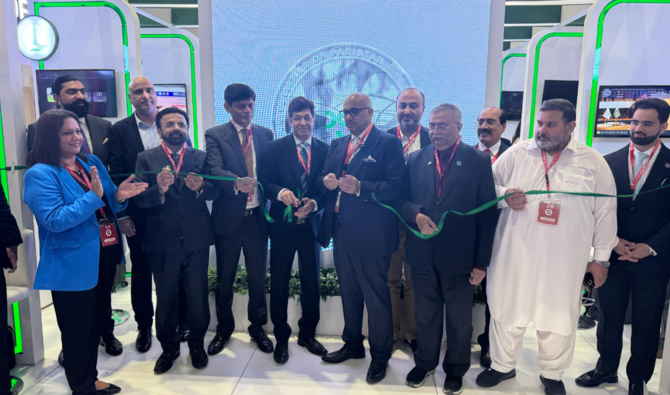WASHINGTON: Pakistan’s election has been remarkable in producing a result disappointing to most of its foreign partners and rivals, with little reason for optimism about the government that will eventually emerge from it, foreign policy analysts said.
Pakistan’s two largest political parties have been wrangling over who will be prime minister after an inconclusive vote last week forced them to join forces and try to form a coalition in a parliament dominated by independents.
Neither former Prime Minister Nawaz Sharif’s Pakistan Muslim League-Nawaz (PML-N), nor the Pakistan Peoples Party (PPP) of Bilawal Bhutto Zardari, son of assassinated former premier Benazir Bhutto, won enough seats to form a government alone.
Independent candidates backed by former Prime Minister Imran Khan represent the largest group, with 93 of the 264 parliamentary seats declared. That shocked many, who had expected their showing to be severely dampened by an intense crackdown on Khan and his party.
But Khan cannot become prime minister as he is in jail and his grouping cannot form a government as they nominally ran as independents as his party was barred from standing.
Some foreign policy analysts said the election results likely indicate voters’ protest against perceptions of the country’s powerful military’s involvement in politics. But the military denies it interferes in the country’s politics.
That adds to the political instability given the military’s strong historic role in the security and foreign affairs of the nuclear-armed nation.
“Pakistan has been on a slippery slope for some time but a mild one. The slope is now much stiffer,” said Frederic Grare, a South Asia expert at the Australian National University’s National Security College.
“The military will most likely be able to manage the situation for some time but ... the political situation is likely to be less and less stable.”
It’s a messy scenario no one wanted — not China, Pakistan’s main foreign backer, not India, Pakistan’s nuclear-armed neighbor and bitter rival, nor the United States, which has a reduced stake in Pakistan after quitting Afghanistan in 2021, but remains concerned about Islamist militancy as a broader source of instability in the region and beyond, analysts said.
The prospect of a weak, divided government also raises questions about whether Pakistan will be able to undertake reforms needed to secure a vital new International Monetary Fund program later this year.
Last week, the United States, Britain and the European Union separately expressed concerns about Pakistan’s electoral process and urged a probe into reported irregularities. Pakistan’s caretaker prime minister rejected those allegations.
Possibly the only countries taking any comfort from the outcome will be some in the Middle East.
“Imran Khan did not have a great relationship with many of Pakistan’s traditional Gulf partners,” said Joshua White, a former White House adviser now at Johns Hopkins University’s School of Advanced International Studies.
“I think the Saudis and the Emiratis are likely to be relatively comforted by the that he is locked away and that his party probably ... will not form government in Pakistan.”
’MORE CONFUSION AND UNCERTAINTY’
Tamanna Salikuddin, South Asia director at Washington’s United States Institute of Peace think tank, said that rather than resolving the political crisis Pakistan has been plagued with since Khan was ousted in 2022, the election “has created more confusion and uncertainty.”
“This election not only reveals the lack of trust that Pakistanis have in their leaders, but also it is evidence that no institution or leader has a plan to fix the economy, nor do they have the political capital to make any of the very difficult and painful reforms to turn around this failing economy,” she said.
“Much of Pakistan’s debt is owed to the Chinese, and they will also be concerned about Pakistan’s lack of economic reforms.”
China’s multi-billion dollar China-Pakistan Economic Corridor is a key part of Chinese President Xi Jinping’s signature Belt and Road infrastructure initiative.
CPEC has slowed in recent years and a strong mandate by any future Pakistani government would be needed to cut through red tape and get it on track.
Elizabeth Threlkeld, a former US diplomat in Pakistan now with the Stimson Center think tank, said negotiating a new IMF deal was the number one-priority for a new government.
“Any prolonged political uncertainty would complicate that process at a time when Pakistan can ill-afford delays,” she said.
Former Indian diplomats said the muddled poll result created difficulties for India’s relationship with its nuclear-armed rival and Delhi was likely to take a “wait-and-watch” approach.
Sharat Sabharwal, India’s high commissioner to Pakistan from 2009-2013, said it would also be difficult for a new Pakistani government to move forward in relations with India.
“It needs political consensus to be able to move forward on that. And that consensus will not be there ... if you do something on India, your opponents are going to immediately accuse you of a sell-off.”
Popular Khan has also publicly accused the US of being part of a conspiracy to topple his government. Washington has denied being involved in any such conspiracy and Khan has been convicted over allegations of leaking diplomatic correspondence between Islamabad and Washington, which he denies.
“After two years of turmoil, the international community simply wants a functioning government with some legitimacy in Pakistan,” said Husain Haqqani, Pakistan’s former ambassador to Washington and a senior fellow at the Hudson Center.
“They want to be able to deal with Pakistan without fear of normal diplomatic interaction being turned into a conspiracy theory.”
















